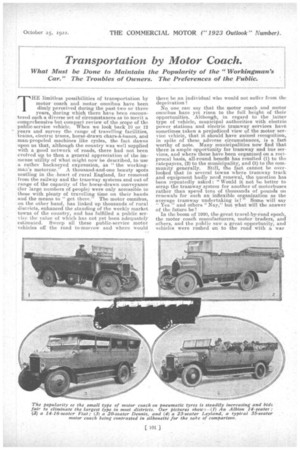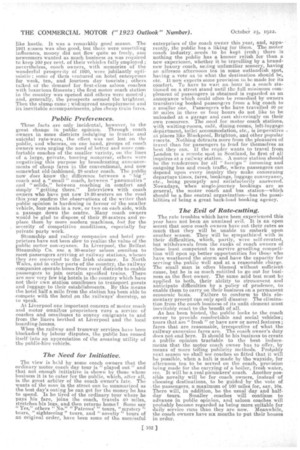Transportation by Motor Coach.
Page 31

Page 32

If you've noticed an error in this article please click here to report it so we can fix it.
What Must be Done to Maintain the Popularity of the "Workingman's Car." The Troubles of Owners. The Preferences of the Public.
THE limitless possibilities of transportation by motor coach and motor omnibus have been dimly perceived during the past-two or three years, during which there have been encountered such a diverse set of circumstances as to merit a comprehensive but compact review of the scope of the public-service vehicle. When we look back 10 or 12 years and survey the range of travelling. facilities, trains, electric trams, horse-drawn chars-a-bancs, and man-prope led machines like cycles, the fact dawns upon us that, although the country was well supplied with a good network of roads, there had not been evolved up to then a general appreciation of the immense utility of what might now be described, to use a rather hackneyed expression, as " the workingman's motorcar." A thousand-and-one beauty spots nestling in the -heart of • rural England, far removed from the railway and the tramway systems and out of range of the capacity of the. horse-drawn conveyance (for large numbers of people) were only accessible to those with plenty of travelling time on their hands and the means to " get there.' The motor omnibus, on the other hand, has linked up thousands of rural districts, enhanced the standing of the weekly market • towns of the country, and has fulfilled a public service the value of which, has not yet been adequately estimated. Sweep all these public-service motor vehicles off the road to-morrow and where would
there be an individual who would not suffer from the de-privation?
No one can say that the motor coach and motor omnibus have yet risen to the full height of their opportunities. Although, in regard to the latter type of -vehicle, municipal authorities with electric power stations and electric tramway services have sometimes taken a prejudiced view of the motor service vehicle, that it should have gained recognition, in spite of these adverse circumstances, is a fact worthy of note. Many municipalities now find that there is ample opportunity for tramway and bus services, and where these have been organized on a reciprocal basis, all-round benefit has resulted (1) to the ratepayers, (2) to the municipality, and (3) to the community generally. Still, the fact cannot be overlooked that in several towns where tramway track and equipment badly need renewal, the question has been repeatedly asked: "Would it not be better to scrap the tramwaysystem for another of motorbuses rather than spend tens of thousands of pounds on renewals for such an inflexible organization as the
average tramway undertaking is? Some will say Yea" and others "Nay," but what will the answer of the future be?
In the boom of 1920, the great travel-by-road epoch, the motor coach nranufaeturers, motor traders, and others, and the public saw a great opportunity, and vehicles were rushed on to the road with a war like hustle. It was a remarkbly good season. The 1921 season was also good, but there were unsettling influences, money did not flow quite so freely, and newcomers wanted as much business as was required to keep 100 per cent, of their vehicles fully employed ; nevertheless, coach owners, with memories of the wonderful prosperity of 19,20, were iubilantly opti mistie ; some of them ventured on hotel enteaprises for week, ten, and fourteen day tourists ; others talked or the demand for first-class saloon coaches with luxurious fitments ; the first motor coach station in the country was opened and otheys were mooted ; and, generally, the prospects seemed the brightest. Then the slump came ; widespread unemployment and its inevitable accompaniments, plus cheap train fares.
Public Preferences.
These facts are only incidental, however, to the great change in public opinion. Throughcoach owners in some districts indulging in frantic and suicidal rate-wars, the effect was not lost on the . public, and whereas, on one hand, groups of coach owners were urging the need of hettet and more comfortable coaches of the smaller variety, on the lines of a large, private, touring motorcar, others were negativing this purpose by broadcasting announcements of cheap fares in the conventional, and now somewhat old-fashioned, 28-seater coach. The public now does know the difference between a " big" coach and a " small "• coach, between " pneumatics" and " solids," between coaching in comfort • and simply"getting there." Interviews with coach owners who have put new 18-20-seaters on the road this year confirm the observations of the writer that public dphaion is hardening in favour of the smaller four seats in h, row, or two on each side, with a passage down the centre. Many coach owners would be glad to dispose of their 28-seaters and replace them by more modern machines, but for the severity of competitive conditions, especially for private party work.
Steamship and railway companies and hotel proprietors have not been slow to realize the value of the public motor conveyance. In Liverpool, the Belfast Steamship Co. use a 30-seater saloon omnibus to meet Passengers arriving at railway stations, whence they are conveyed to the Irish steamer. In North Wales, and in other parts of the country, the railway companies operate buses from rural districts to enable passengers to join certain specified trains. There are now very few big hotels in the country which have not their own station omnibuses to transport guests and luggage to their establishments. By this means the hotel half a mile from the station has been able to .compete with the hotel prs the railways' doorstep, so to speak.
At Liverpool one important concern of motor coach and motor omnibus proprietors runs a, service of coaches and omnibuses to convey emigrants to and from the liners berthed at Liverpool and the local boarding-houses. When the railway and tramway services have been blockaded by labour disputes, the public has roused itsell'into an appreciation of the amazing utility of the public-hire vehicle.
The Need for Initiative.
The view is held by some coach owners that the ordinary motor coach day tour is "played out" and that not enough initiative is shown by those whose business it is to cater for the public, which, after all, is the great arbiter of the coach owner's fate. The wants of the man in the street can be summarized as the best day's outing he can get for the money he has to spend. Is he tired of the ordinary tour where he pays his fare, joins the coach, travels 40 miles, stretches. his legs, and then returns home I Some say "Yes," others " No." " Patrons' " tours, "mystery tours, " sightseeing " tours, and " novelty " tours of an original order, have been some of the successful
enterprises of the coach owner this year, and, apparently, the public has a liking for them. The motor coach industry, needs to be kept fresh there is nothing the public has a keener relish for than a new experience, whether it be travelling by a brandnew luxury coach, seeing unfamiliar scenery, having an alfresco afternoon tea in some outlandish spot, having a -vote as to what the destination should be, etc. It now expects some provision to be made for its comfort. To have to wait an hour in a coach stationed on a street stand until the full minimum eonaplement of passengers is obtained is regarded as an annoyance which could often be remedied by owners transferring booked passengers from a big coach to a smaller one. Passengers who have travelled 40 or 50 miles in three or four hours do not like to be unloaded at a garage and cast shiveringly on their own resources. The need for motor coach stations, with waiting-rooms, cafe, dining-rooms, left-luggage department, toilet accommodation, etc. is imperative at places like Blackpool, Brighton, and other popular resorts. .Nothing detracts more from the pleasures of travel than for passengers to fend for themselves as best they can. If the reader wants to travel from London to a remote spot in Scotland, he first of all inquires at a railway station: -A motor station should be the rendezvous for all " foreign " incoming and outgoing bus and coach traffic, where passengers can depend upon every inquiry they make concerning departure times, fares, bookings, luggage conveyance, etc., being promptly and Satisfactorily answered. Nowadays, when single-journey bookings are so general, the motor coach and bus station—which should be a fine central organization—has the possibilities of being a great back-load booking agency.
The Evil of Rate-cutting.
The rate troubles which have been experienced this year have not been an unmixed evil. It is an open secret that some coach owners have cut their rates so much that they will be unable to embark upon another season. They will be sympathized with in their difficulties, which, partly, were self-created, but withdrawals from. the ranks of coach owners of those least competent to survive gruelling competition will open up better opportunities for those who have weathered the storm and have the capacity for serving the public well and at a reasonable charge. The small man is often blamed without sufficient cause, but he is as much entitled to go out for business as the fleet owner. The same acid test must be applied to both, their ability to circumvent and anticipate difficulties by a policy of prudence, to enable them to carry on their business on a permanent
economic basis. Failure to conform to this -elementary precept can only spell disaster_ The elimination from the coach business of its unfit element must inevitably react to the benefit of all. As has been hinted, the. public looks to the coach owner to provide comfortable and social vehicles; tours that are "fresh " or have new or novel features; fares that are reasonable, irrespective of what the railway excursion fares are. The costeh owner's duty does not end here. It should be his business to create a public opinion tractable to the best inducements -that the motor coach owner has to offer, by means of more telling publicity methods. Proliably next season we shall see coaches so fitted that it will be possible, when a halt is made by the wayside, for afternoon tea to be served on the coach, provision being made. for the carrying of a boiler, fresh water, etc. It will be a real picnickers' coach. Another possible novelty will be for coach owners, instead -of choosing destinations, to be guided by the vote of the passengers, a. maximum of 100 miles for, say, 10s. There will, in addition, be the usual day and halfday tours. Smaller coaches will continue to advance in public opinion, and saloon coaches will probably become regarded as being more suitable for daily service runs than they are now. Meanwhile, the coach owners have six months to put their houses in order.






















































